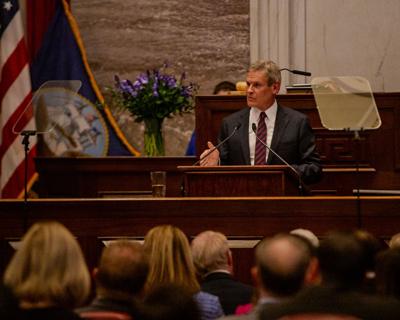Tennessee’s budget is $10 billion leaner this year, a consequence of flat growth and the end of big one-time spending projects. Hours before Gov. Bill Lee’s Feb. 5 State of the State address, Finance and Administration Commissioner Jim Bryson pitched the 545-page budget book to reporters in an underground carpeted conference room at the state Capitol.
“It’s a little bit tighter this year from a budget perspective,” Bryson told the room. “But we’re still in good shape, and we’re going to come through just fine. Because of the conservative and fiscally sound principles we’ve had over the last few years.”
One-time spending — like Lee’s headline Transportation Modernization Act, which passed last year — inflated the 2023 budget. This year includes two such frills: Lee’s Education Freedom Scholarship Act, which will cost an estimated $144 million, and the repeal of the state franchise tax, which will cost the state an estimated $410 million in annual revenue. The corporate gift comes at the expense of sales tax and grocery tax holidays, popular breaks on everyday spending that the state has cut in 2024.
Base spending, backed mostly by sales taxes, remains stable for Tennessee — this year’s cuts come from programs and operational costs. With a few marginal exceptions, most departments retain last year’s staffing levels, while a few get small bumps.
The state budgeted for an expanded highway patrol, for example, and expanded ranks for Tennessee’s pugnacious Attorney General Jonathan Skrmetti. A 10-position bump for Skrmetti this year reflects a new Strategic Litigation Unit, the AG’s small task force new in 2023 focused on impact litigation, specifically conservative challenges to the reach and power of the federal government. So far, the Scene has tracked down exactly one hire: attorney Whitney Hermandorfer, a darling of the Federalist Society whose résumé includes clerkships with Samuel Alito, Amy Coney Barrett and Brett Kavanaugh. The office as a whole got a $10 million payroll bump this year, Lee’s stamp of approval for Skrmetti’s work. Salaries in the AG’s office have skyrocketed 30 to 40 percent across the board since 2021.
Education and TennCare make up the biggest slices of state spending, followed by the state prison system, social programs, state environment and conservation efforts, transportation, capital spending and debt service. Budget season is also a cool reminder that Tennessee is a financial dependent of the White House. Federal dollars splash across nearly every page, vastly outweighing state contributions to popular and critical government services like health care, clean water and interstate highways. Federal money covered $19.7 billion of the state’s $52.6 billion bottom line this year.
Private school scholarships, permitting reform among priorities for 2024 session
Lee and Bryson made a specific point to highlight a $20 million appropriation to the state’s officially titled Rainy Day Fund. In theory, the cash stash hedges against “revenue fluctuations.” It’s risen from $1.2 billion in 2020 to just over $2 billion today thanks to yearly deposits of $250 million, $100 million, $250 million and $250 million — serious money from past years that make this year’s $20 million look like a pittance. That pittance, however insignificant, still got headline mentions from Bryson and Lee, casting the Rainy Day Fund more like a political instrument for performatively saving money. Meanwhile, Lee spent down the state’s primary fund balance; $5 billion available to Lee on June 30 last year will be just $187 million when the fiscal year ends this summer.
The lean budget also means curtailing grantmaking and continued funding for programs supporting job training, agriculture, business development, broadband accessibility and rural economic development. Those programs featured heavily in Lee’s 2022 jobs-and-bridges reelection speech, but under a little bit of financial pressure, they lose out to vouchers and corporate tax cuts. Lee’s $410 million franchise tax carve-out allows businesses to claim refunds for taxes already paid, a cost that could shake down Tennessee for another $1.2 billion. As Lee’s voucher program evolves toward Education Freedom Scholarships — essentially publicly funded coupons for private school tuition — such handouts could become an increasing portion of budgets in years to come. Six months after losing his voucher point person Penny Schwinn to Florida, Lee has a new headache in replacement Education Commissioner Lizzette Reynolds and a still-rocky rollout for education savings accounts.
A new and expensive effort to revamp vouchers shows that, with two years left in office, Lee won’t let them go.






